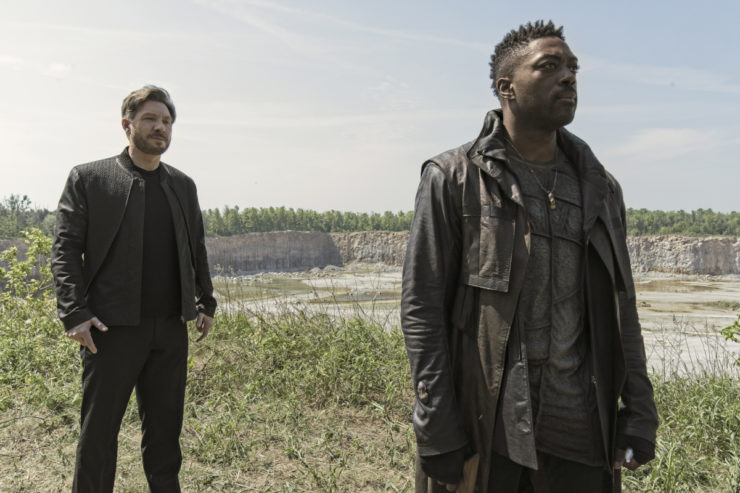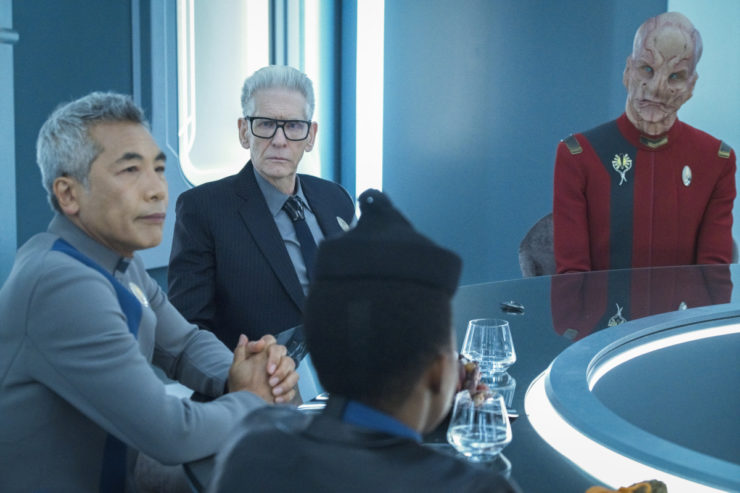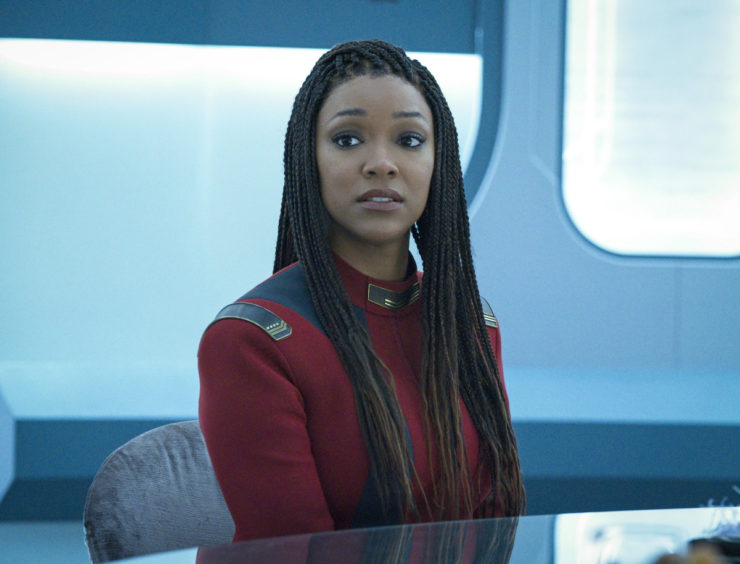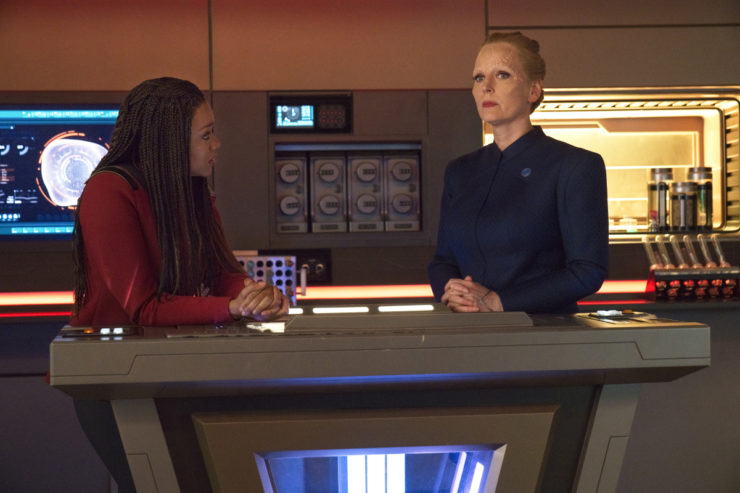The galactic barrier was one of the very first things Star Trek ever gave us. Debuting in the second pilot, “Where No Man Has Gone Before,” the barrier surrounding the galaxy (a scientifically absurd notion, by the way) was also seen in “By Any Other Name” and “Is There in Truth No Beauty?” But while the barrier showed up in various works of tie-in fiction (notably, Q-Squared by Peter David and The Q-Continuum trilogy by Greg Cox, which had two contradictory takes on the barrier’s origin), it never appeared in any of the movies or TV spinoffs.
Until now.
Species 10C is located outside the galaxy, which means our heroes need to traverse the galactic barrier. Apparently, a thousand years of technological advances still don’t allow ships to be able to pass safely without serious risk. There is also a sop to the original series’ bit about how people with a “high ESP rating” (ah, 1966) were either killed or became god-like beings with silver eyes, to wit, a line about how going through the barrier can fry your cerebral cortex.
Buy the Book


Until the Last of Me
Discovery is taking the trip, not just because the show is called Star Trek: Discovery, but because there are only two ships that can travel to the edge of the galaxy in no time flat, and the other one is still at large. Book and Tarka are still on the run, trying to get to Species 10C also so Tarka can get at the power source and so Book can stop the DMA.
We also finally get the Secret Origin of Ruon Tarka. Flashbacks detail his relationship with the scientist friend he mentioned previously, who turns out to be an alien named Oros. Osric Chau—having already been magnificent in his recurring roles on Supernatural as Kevin Tran and The Flash as Ryan Choi, a.k.a. The Atom—is beautifully understated here as Oros. Tarka and Oros first meet when Osyraa assigned Tarka to help Oros build a new warp engine that didn’t require dilithium. Shawn Doyle is particularly strong in the flashback sequences, as Tarka’s snottiness is significantly more subdued. A miasma of oppression hangs over the lab, and both Doyle and Chau show how much they’ve been beaten down by the Emerald Chain’s enslavement through their body language. Chau’s face is entirely swallowed by makeup and prosthetics, so body language and voice are his only tools to use, and he uses them both brilliantly.
At first, Oros and Tarka’s relationship is reluctant and professional, but that changes before too long. It becomes clear as the flashbacks progress that they became lovers. And they also developed an interdimensional transporter, which requires a massive power source. Their first test fails rather spectacularly. Oros is badly injured by an Emerald Chain thug, but Tarka is able to subdue the thug and use his weapon to blast off the control chip on his neck. But Oros is too badly injured to travel, and Tarka must leave him behind.
We find this all out when Book and Tarka go to the same planet where Tarka and Oros had been imprisoned—now long-since abandoned. They’re there to get programmable antimatter, which will help shield Book’s ship against the barrier’s energies.

Meantime, Discovery is already at the barrier. In a nice touch, the mycelial network is only intra-galactic. So they can’t jump outside the barrier, and in fact the network is very thin on the edges of the galaxy. Stamets says he can only get them within four light-years of the barrier, which turns out to be optimistic—the ship arrives nine light-years away. (“Commander Stamets,” Burnham says tartly, “you owe me five light-years.”) Then they have to get through it, which proves to be more complicated than it was for Kirk’s ship.
They also have a time problem. The new DMA that replaced the one Tarka blew up last week is more efficient. Instead of taking a week to mine boronite, it’ll take less than a day. To make matters worse, when it’s done, its next stop is a location proximate to both Earth and Ni’Var.
Accompanying Discovery is a diplomatic team, led by President Rillak. Because of the shortened time frame thanks to the new DMA with go-faster stripes, Rillak has decided that she must lead the first contact team. She’s even invoked the Federation Constitution’s equivalent of the U.S. Constitution’s 25th Amendment, leaving the vice president in charge while she’s gone. This makes sense, as she knows there’s a chance Discovery won’t be coming back, even if the viewer knows better. Besides, even if Discovery does make it back, that’s no guarantee that Rillak will survive. (Though if they kill the first on-screen female Federation president, I will not be happy. Bad enough that the one in the tie-in fiction that I created was killed off…)
The rest of the team includes Ni’Var President T’Rina, whose burgeoning relationship with Saru takes a few tentative steps forward; a doctor who is a specialist in astrolinguistics, xenophrenology, and theoretical semiotics, played with an entertaining lack of fucks to give by Hiro Kanagawa; General Ndoye, an always-welcome return by Phumzile Sitole; and a Ferengi. We’ve seen this Ferengi before, as part of the gathering in “…But to Connect,” but he has yet to be identified. Maybe next week.

As with last week, we have someone on the bridge in Rillak who might come into command conflict with Burnham—indeed, someone who has done so before, in “Kobayashi Maru.” But Burnham and Rillak—like Burnham and Nhan—talk things out ahead of time. But then we have the conflict…
Vance contacts Discovery to inform them that the DMA is now endangering Earth, Titan, and Ni’Var (among, presumably, lots of other worlds). Burnham wants to tell the crew, and Rillak wants to keep that information classified.
On the one hand, from a military standpoint, Rillak is absolutely right. The crew and the contact team need to be focused, and being told that their homes are in danger is not a great way to stay focused.
On the other hand, from a Star Trek standpoint, Burnham’s right. Jean-Luc Picard once reminded us all that a Starfleet officer’s first duty is to the truth, and Burnham believes it’s more important for the crew to know the stakes.
Star Trek is an idealized future, and because of that, we’re dealing with people who are the best and the brightest. This crew has been through hell and back together and they’re professionals of the highest order. Ideally, as professionals, they shouldn’t be adversely affected by such news, and Trek is an ideal future.
At the end of the episode, once the ship has gotten through the barrier and into extragalactic space, Rillak addresses the entire ship and shares the bad news.
One of the things I’ve liked about Discovery is that they’ve avoided the evil admiral/obdurate bureaucrat trope that has been a lazy, tired part of the franchise going back to “A Taste of Armageddon” on the original series. But starting with Cornwell in seasons one and two and continuing to Vance last year and Rillak this year, the authority figures have, refreshingly, not been impediments to Our Heroes doing their jobs. And I like that Burnham recognizes the importance of the president being the one to give the speech at the end, even though the clichés of television demand that your lead be the one to do that sort of thing.

There are lots of nice characterization touches throughout the episode: Saru telling T’Rina how he feels, and T’Rina eventually sorta-kinda telling him the feeling’s mutual later on; Adira’s return and Stamets being the adorably overly complimentary doting father-figure (Blu del Barrio and Anthony Rapp are magnificent in their scenes together); Rhys nerding out over the galactic barrier; Saru and Bryce’s conversation when the latter is left behind to work on a way for subspace communication to penetrate the galactic barrier; Kovich saying he can’t go on the mission because he has other matters to attend to, with Ndoye expressing shock that there could possibly be any other matters to attend to, but nonetheless a reminder that it’s a big universe and there’s always more stuff going on than we can see; and my favorite moment, when Nilsson assures the new comms officer, Christopher, that they’ll be okay and he’ll be back home and skiing in a month, and then Nilsson, Rhys, Detmer, and Owosekun talk about what vacation they’ll take when the mission’s over.
Besides doing a lovely job of reminding us that the bridge crew are people, not just automatons who say “Aye sir” a lot, it also complicates the whole should-we-tell-them-where-the-DMA-is-now conflict.
But the best character work here is Tarka, as everything he’s done comes into focus. He found love in a miserable situation, and was forced to abandon that lover. He doesn’t even know if Oros is still alive, and if he goes to the quantum reality they found where there’s peace and happiness, there’s no guarantee that Oros will be there. But Tarka’s entire life since he escaped the Emerald Chain has been in service of this goal, and Species 10C’s power source is his ticket to that other universe.
It’s a pretty selfish goal, and Book’s declaration that he’s really an asshole is 100% accurate. But it’s also a well-played tragedy, Tarka hoping against hope to be reunited with Oros.
With all that this episode accomplishes on a character front, there’s not a whole heckuva lot of forward plot movement. It was all getting to the first contact instead of actually having the first contact. While I can’t say the journey is more important than the destination, the journey did have some meat to it. But it will also be nice to be at the destination next week. Let’s hope…
Keith R.A. DeCandido is one of the contributors to the anthology The Fans are Buried Tales, edited by Peter David & Kathleen O. David, currently being crowdfunded on Kickstarter. It’s about a bunch of cosplayers snowed in at a convention who gather in the bar and tell stories in character for who/whatever they’re cosplaying as. Keith’s is “The Carpet’s Tale” (the cult of the Marriott carpet lives!!!!). Besides Keith and Peter, other Star Trek prose stylists contributing include Michael Jan Friedman, Robert Greenberger, Aaron Rosenberg, John Peel, Rigel Ailur, and Robert T. Jeschonek. Please consider supporting it!










